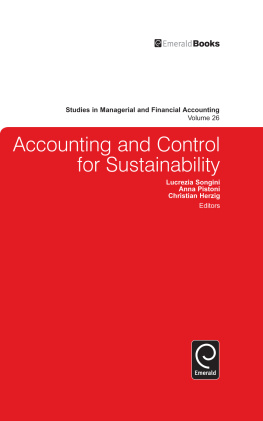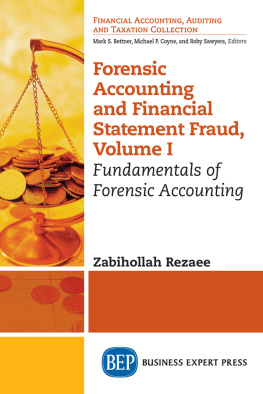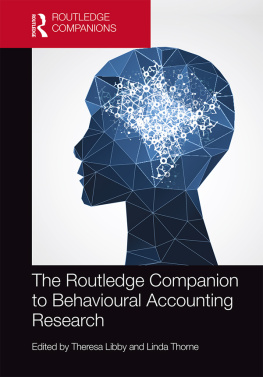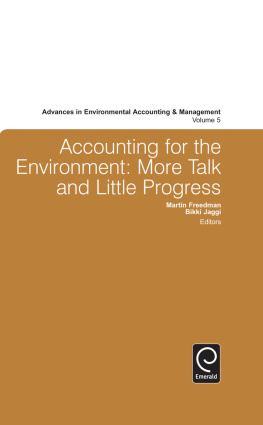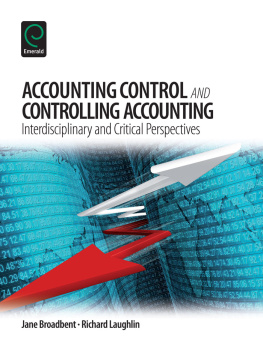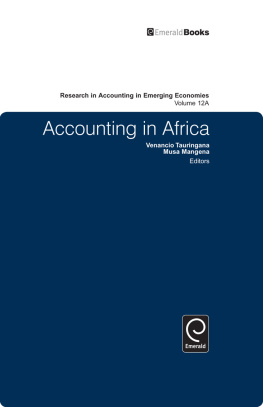ACCOUNTING AND CONTROL FOR SUSTAINABILITY
STUDIES IN MANAGERIAL AND FINANCIAL ACCOUNTING
Series Editor: Marc J. Epstein
Recent Volumes:
Volume 10: | Organizational Change and Development in Management Control Systems: Process Innovation for Internal Auditing and Management Accounting |
Volume 11: | US Individual Federal Income Taxation: Historical, Contemporary and Prospective Policy Issues |
Volume 12: | Performance Measurement and Management Control: A Compendium of Research |
Volume 13: | Information Asymmetry: A Unifying Concept for Financial and Managerial Accounting Theories |
Volume 14: | Performance Measurement and Management Control: Superior Organization Performance |
Volume 15: | A Comparative Study of Professional Accountants Judgements |
Volume 16: | Performance Measurement and Management Control: Improving Organizations and Society |
Volume 17: | Non-Financial Performance Measurement and Management Practices In Manufacturing Firms: A Comparative International Analysis |
Volume 18: | Performance Measurement and Management Control: Measuring and Rewarding Performance |
Volume 19: | Managerial Attitudes Toward a Stakeholder Prominence within a Southeast Asia Context |
Volume 20: | Performance Measurement and Management Control: Innovative Concepts and Practices |
Volume 21: | Reputation Building, Website Disclosure and the Case of Intellectual Capital |
Volume 22: | Achieving Global Convergence of Financial Reporting Standards: Implications from the South Pacific Region |
Volume 23: | Globalization and Contextual Factors in Accounting: The Case of Germany |
Volume 24: | An Organizational Learning Approach to Process Innovations: The Extent and Scope of Diffusion and Adoption in Management Accounting Systems |
Volume 25: | Performance Measurement and Management Control: Global Issues |
STUDIES IN MANAGERIAL AND FINANCIAL ACCOUNTING VOLUME 26
ACCOUNTING AND CONTROL FOR SUSTAINABILITY
EDITED BY
LUCREZIA SONGINI
Department of Economics and Business, Eastern Piedmont University, Italy
ANNA PISTONI
Deparment of Economics, Insubria University, Italy
CHRISTIAN HERZIG
Nottingham Business School, Nottingham Trent University, UK

United Kingdom North America Japan India Malaysia China
Emerald Group Publishing Limited
Howard House, Wagon Lane, Bingley BD16 1WA, UK
First edition 2013
Copyright 2013 Emerald Group Publishing Limited
Reprints and permission service
Contact: permissions@emeraldinsight.com
No part of this book may be reproduced, stored in a retrieval system, transmitted in any form or by any means electronic, mechanical, photocopying, recording or otherwise without either the prior written permission of the publisher or a licence permitting restricted copying issued in the UK by The Copyright Licensing Agency and in the USA by The Copyright Clearance Center. Any opinions expressed in the chapters are those of the authors. Whilst Emerald makes every effort to ensure the quality and accuracy of its content, Emerald makes no representation implied or otherwise, as to the chapters suitability and application and disclaims any warranties, express or implied, to their use.
British Library Cataloguing in Publication Data
A catalogue record for this book is available from the British Library
ISBN: 978-1-78052-766-6
ISSN: 1479-3512 (Series)


CONTENTS
Anna Pistoni and Lucrezia Songini
Francesco Gangi and Carmen Trotta
Simone Domenico Scagnelli, Laura Corazza and Maurizio Cisi
Silvana Signori and Gerald Avondo Bodino
Nathalie Crutzen and Christian Herzig
Giovanni Battista Derchi, Michael Burkert and Daniel Oyon
Cristiana Parisi
Stefan Schaltegger and Dimitar Zvezdov
LIST OF CONTRIBUTORS
| Gerald Avondo Bodino | SCAME Parre SpA, Italy |
| Michael Burkert | Faculty of Economics and Social Sciences, University of Fribourg, Fribourg, Switzerland |
| Maurizio Cisi | Department of Management, University of Torino, Torino, Italy |
| Laura Corazza | Department of Management, University of Torino, Torino, Italy |
| Nathalie Crutzen | HEC Management School University of Liege, Liege, Belgium |
| Giovanni Battista Derchi | Department of Accounting and Control, HEC Lausanne, Faculty of Business and Economics, University of Lausanne, Lausanne, Switzerland |
| Francesco Gangi | Department of Economics, Seconda Universit di Napoli, Naples, Italy |
| Christian Herzig | Nottingham Business School, Nottingham Trent University, Nottingham, UK |
| Daniel Oyon | Department of Accounting and Control, HEC Lausanne, Faculty of Business and Economics, University of Lausanne, Lausanne, Switzerland |
| Cristiana Parisi | Copenhagen Business School, Frederiksberg, Denmark |
| Anna Pistoni | Deparment of Economics, University of Insubria, Varese, Italy |
| Simone Domenico Scagnelli | Department of Management, University of Torino, Torino, Italy |
| Stefan Schaltegger | Centre for Sustainability Management (CSM), Leuphana University Lneburg, Lneburg, Germany |
| Silvana Signori | Department of Management, Economics and Quantitative Methods, University of Bergamo, Bergamo, Italy |
| Lucrezia Songini | Department of Economics and Business, Eastern Piedmont University, Novara, Italy |
| Carmen Trotta | Department of Economics, Seconda Universit di Napoli, Naples, Italy |
| Dimitar Zvezdov | Centre for Sustainability Management (CSM), Leuphana University Lneburg, Lneburg, Germany |
INTRODUCTION
Sustainability and corporate social responsibility (CSR) refer to a companys activities which include social and environmental concerns in business operations and various forms of interaction with its stakeholders. Transparency, public disclosure, stakeholder engagement and management, business model, information management, and so on should all be tailored to be in line with the context and specific objectives of sustainability and CSR pursued by a company.
In this context, sustainability accounting is seen to play a central role as it can support the implementation of the sustainability strategy, embedding sustainability into day-to-day operations and decision making, and developing relationships with stakeholders based on trust and legitimacy. It comprises, in fact, internal and external accounting practices and mechanisms devoted to measure, represent and communicate the companys performance, and embraces environmental, social, and economic aspects of the business life and their relationships. Among these mechanisms, sustainability/CSR disclosure has become a prominent phenomenon, consistently with the legitimacy theory and the stakeholder theory. Such theories consider the company as part of an open system where different subjects interact with each other. This system-oriented understanding of the company highlights the role of information and disclosure in the relations among organizations, institutions, individuals, and groups. In particular, legitimacy theory postulates that a company aims to measure and communicate its performance consistently with the expectations of different societal groups in order to (re)gain or maintain its social acceptance and legitimacy. Stakeholder theory provides another useful frame for understanding the existence, role, and nature of CSR disclosure. In fact, information and communication represent some of the most important ways through which the company engages with different stakeholder groups in order to obtain their support and approval, or, vice versa, to try to remove their opposition and disapproval.

